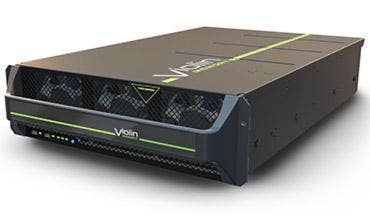Violin Memory Expands All-flash Line As Way To Grow Its Primary Storage Business

Flash storage developer Violin Memory is stepping out of its traditional comfort zone of focusing on database acceleration to expand its market possibilities with the introduction of new all-flash storage solutions for a wider range of workloads.
Violin Memory on Tuesday unveiled a new entry-level all-flash array and a new high-density flash storage array into its Flash Storage Platform (FSP) family, said Jeff Nollete, vice president of channel sales for the Santa Clara, Calif.-based storage vendor.
"We're segregating the offering to be conducive to workloads for flash," Nollete told CRN. "We're segregating into a capacity play and a performance play."
[Related: The 10 Coolest Flash Storage And SSD Products Of 2015]
With the move, Violin Memory is transforming from a focus on high-end, tier-0 flash storage solutions to more of a primary storage play, Nollete said.
"Violin Memory had been cornering itself in its TAM [total addressable market]," he said. "It was a one-trick pony in focusing on the high end of the market. So now we've expanded to primary storage. We are a high-end data storage solution provider rather than a provider of database acceleration solutions."
The move to expand its product line and potential market is one that was overdue, said Tom Holt, vice president of sales at Bedrock Technology Partners, a San Diego-based solution provider and Violin Memory channel partner.
Violin Memory needed to break away from its older image for a number of reasons, Holt told CRN.
"Chief is the fact that flash is going to be a hot market for the foreseeable future," he said. "You don't want to be pigeonholed as a database accelerator. There's a lot of room for both established and new players. Also, from a partner perspective, having more clients to sell to is important. Violin needed to change to get more clients."
Violin Memory is currently in a growth mode, and not a "defend" mode, Holt said. "It will need more selections, more offerings, a broader line," he said. "In fact, there's nobody in the defend mode in the flash market today."
New to the Violin Memory FSP 7000 family is the FSP 7600, which provides what Nollete termed "extreme performance." The FSP 7600 features 1.1 million IOPs with a sub-500-microsecond latency, and comes with 140 TBs of raw flash storage capacity installed.
The FSP 7600 is sold on a pay-as-you-grow basis, Nollete said. "Customers can start off paying for as few as 35 TBs of the 140 TBs of included capacity," he said. "They can then access more capacity as needed later. But there's no obligation to pay for the unused capacity."
The FSP 7600 is a good platform for customers looking to migrate from older FSP 3000 solutions, which have already entered end-of-life, and the older FSP 6000 solutions, which will go into end-of-life soon, Nollete said.
Also new is the FSP 7250, a new entry-level model which comes with 26 TBs of raw flash storage capacity in a 3U enclosure. With compression and dedupe, actual capacity can be as high as 92 TBs, Nollete said.
Pricing for the FSP 7250 starts at under $100,000 for 8 TBs of capacity. Like the FSP 7600, customers can also get immediate capacity upgrades as needed, he said.
Nollete admitted that Violin Memory's pay-as-you-grow offerings are a somewhat risky move for the company. "You can say we're making a bet that customers will continue to expand their capacity in the future," he said.
Like Violin Memory's FSP 7700 solution, which scales up to 1.4 PBs of raw flash storage capacity, and its midrange FSP 7300 solution, the FSP 7250 and FSP 7600 feature the company's Violin Intelligent Memory (VIM) modules instead of standard SSDs for capacity, Nollete said.
The VIM modules, which are now transitioning to new 2-TB versions, which double the capacity of its previous modules, feature intelligence that increases performance by handling much of the mundane management of flash storage that in standard SSDs is handled by the storage host, he said.